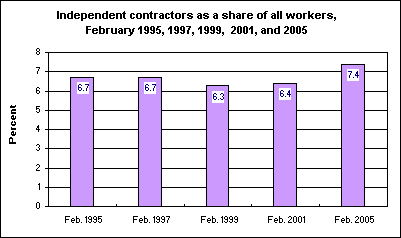What follows is my views on the consulting industry as an insider for the past twenty years. I am sure that if well researched this issue could be expanded a heck of a lot. (Feel free to add your own comments)
When Peter Drucker started out talking about management theory, consulting was really done by a few challenging and innovative entrepreneurs.
The explosion in popularity of his ideas, and the results they were achieving, led to the creation of several large consulting behemoths.
The zenith of this movement seemed to be during the 1990's, fed by the ERP growth curve and strategy consulting.
The period stands out as the point where IBM took a potentially disastrous situation, and turned it into success by throwing themselves head first into the consulting and technology consulting market space.
Today they are one of the worlds clear leaders.
IBM, Accenture, and McKinsey and others continue to stride through the world wielding extremely powerful brands.
However, since the 1990's the line between the consulting and technology consulting has become blurred and we see them competing alongside SAP, Microsoft and Oracle also in several sectors.
But the business model was a little bit skewed. Partners earned (earn) all of the money while crowds of 23 - 33 year olds solved the problems of their world class clients.
So, why couldn't they do it themselves?
In 2001 we saw the Enron disaster, closely followed by the Andersen collapse as a major consulting force. (Reinvented as Accenture) One of the fall outs from this was the separation of consulting (in those days very strategy focused) and accounting in many of the big firms.
That combined with the slump after the dot.com melt down seemed to take the wind out of the sails of many of the large consultancies. Clients were changing again. They wanted a personal touch, long standing relationships. And instead of generalists with an eye for organizational issues, they began looking for deep subject matter experts.
These changes, combined with an ever growing accessibility of technology fed the growth in the so called boutique consultancies. Small to medium sized consultancies who were frequently going head to head with their gigantic counterparts, and beating them for significant multi million dollar projects.
And why not? They were often the same people who used to work for (say) KPMG, only now they were able to consult free of whatever was holding them back before.
Small teams of very capable, hard working professionals. Sometimes rewarded better than their larger counterparts, sometimes not.
Consultants traded the security and protection of the large scale companies for more flexibility, more exciting work, and greater access to the knowledge that would boost their own personal careers. In fact, during my entire career in consulting I have only worked for boutique or mid sized consulting firms.
Today, we again see the turn back to the few challenging and innovative entrepreneurs in the rise of the Independent Consultant.
Changes in the consulting model away from hours and towards value is the one driving issue that has made independent consulting viable for many freelancers.
At the same time providing a better deal for clients.
This has been further helped by the advance of technology in the past two years in particular. Consultants today are easily able to build multiple streams of income through leveraging the internet.
Everything from self publishing and distributing books, through to generating their own niche SaaS or desktop software solutions, through to online communities. Freelance consultant offer diverse services ranging from training to speaking, through to mentoring and other remote assistance packages.
Add to this the fact that productivity software and systems are either exceptionally cheap or free; and you have the perfect storm. Client demand, enabling technologies, and a growing band of individuals who truly believe that freelancing is the place where they will be happiest.
It has taken less than a century for the wheel to spin right around to the point where innovative individuals are again in vogue around the world.
Sure there will always be a need for the giants of the industry, and there will always be a need for deep functional expertise offered by boutiques. But the rise of the independent consultant cannot be overlooked, either by their competitors or by the governments that regulate them, because they are becoming a larger and larger part of the consulting landscape.





